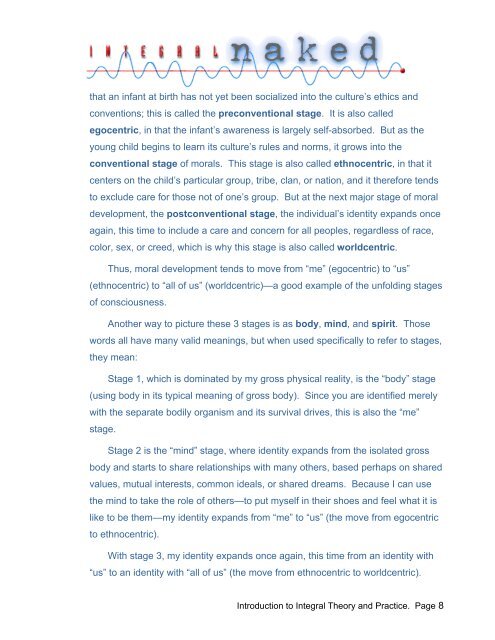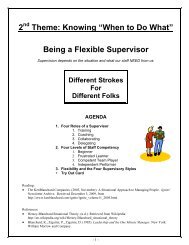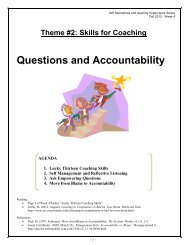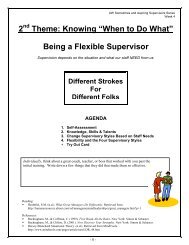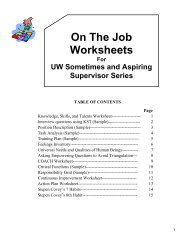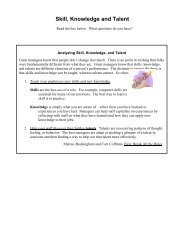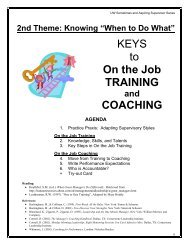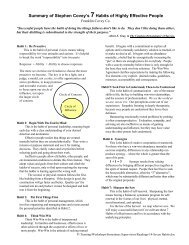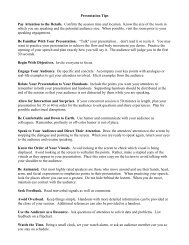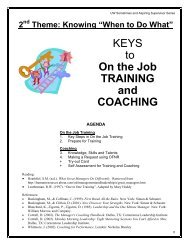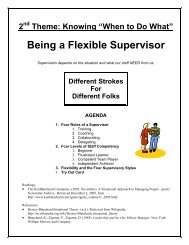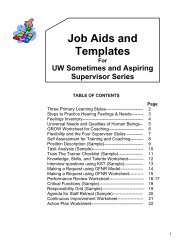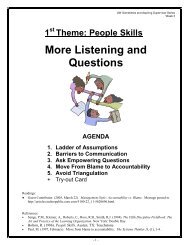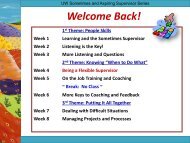Introduction to Integral Theory and Practice IOS Basic and the AQAL ...
Introduction to Integral Theory and Practice IOS Basic and the AQAL ...
Introduction to Integral Theory and Practice IOS Basic and the AQAL ...
You also want an ePaper? Increase the reach of your titles
YUMPU automatically turns print PDFs into web optimized ePapers that Google loves.
that an infant at birth has not yet been socialized in<strong>to</strong> <strong>the</strong> culture’s ethics <strong>and</strong><br />
conventions; this is called <strong>the</strong> preconventional stage. It is also called<br />
egocentric, in that <strong>the</strong> infant’s awareness is largely self-absorbed. But as <strong>the</strong><br />
young child begins <strong>to</strong> learn its culture’s rules <strong>and</strong> norms, it grows in<strong>to</strong> <strong>the</strong><br />
conventional stage of morals. This stage is also called ethnocentric, in that it<br />
centers on <strong>the</strong> child’s particular group, tribe, clan, or nation, <strong>and</strong> it <strong>the</strong>refore tends<br />
<strong>to</strong> exclude care for those not of one’s group. But at <strong>the</strong> next major stage of moral<br />
development, <strong>the</strong> postconventional stage, <strong>the</strong> individual’s identity exp<strong>and</strong>s once<br />
again, this time <strong>to</strong> include a care <strong>and</strong> concern for all peoples, regardless of race,<br />
color, sex, or creed, which is why this stage is also called worldcentric.<br />
Thus, moral development tends <strong>to</strong> move from “me” (egocentric) <strong>to</strong> “us”<br />
(ethnocentric) <strong>to</strong> “all of us” (worldcentric)—a good example of <strong>the</strong> unfolding stages<br />
of consciousness.<br />
Ano<strong>the</strong>r way <strong>to</strong> picture <strong>the</strong>se 3 stages is as body, mind, <strong>and</strong> spirit. Those<br />
words all have many valid meanings, but when used specifically <strong>to</strong> refer <strong>to</strong> stages,<br />
<strong>the</strong>y mean:<br />
Stage 1, which is dominated by my gross physical reality, is <strong>the</strong> “body” stage<br />
(using body in its typical meaning of gross body). Since you are identified merely<br />
with <strong>the</strong> separate bodily organism <strong>and</strong> its survival drives, this is also <strong>the</strong> “me”<br />
stage.<br />
Stage 2 is <strong>the</strong> “mind” stage, where identity exp<strong>and</strong>s from <strong>the</strong> isolated gross<br />
body <strong>and</strong> starts <strong>to</strong> share relationships with many o<strong>the</strong>rs, based perhaps on shared<br />
values, mutual interests, common ideals, or shared dreams. Because I can use<br />
<strong>the</strong> mind <strong>to</strong> take <strong>the</strong> role of o<strong>the</strong>rs—<strong>to</strong> put myself in <strong>the</strong>ir shoes <strong>and</strong> feel what it is<br />
like <strong>to</strong> be <strong>the</strong>m—my identity exp<strong>and</strong>s from “me” <strong>to</strong> “us” (<strong>the</strong> move from egocentric<br />
<strong>to</strong> ethnocentric).<br />
With stage 3, my identity exp<strong>and</strong>s once again, this time from an identity with<br />
“us” <strong>to</strong> an identity with “all of us” (<strong>the</strong> move from ethnocentric <strong>to</strong> worldcentric).<br />
<strong>Introduction</strong> <strong>to</strong> <strong>Integral</strong> <strong>Theory</strong> <strong>and</strong> <strong>Practice</strong>. Page 8


